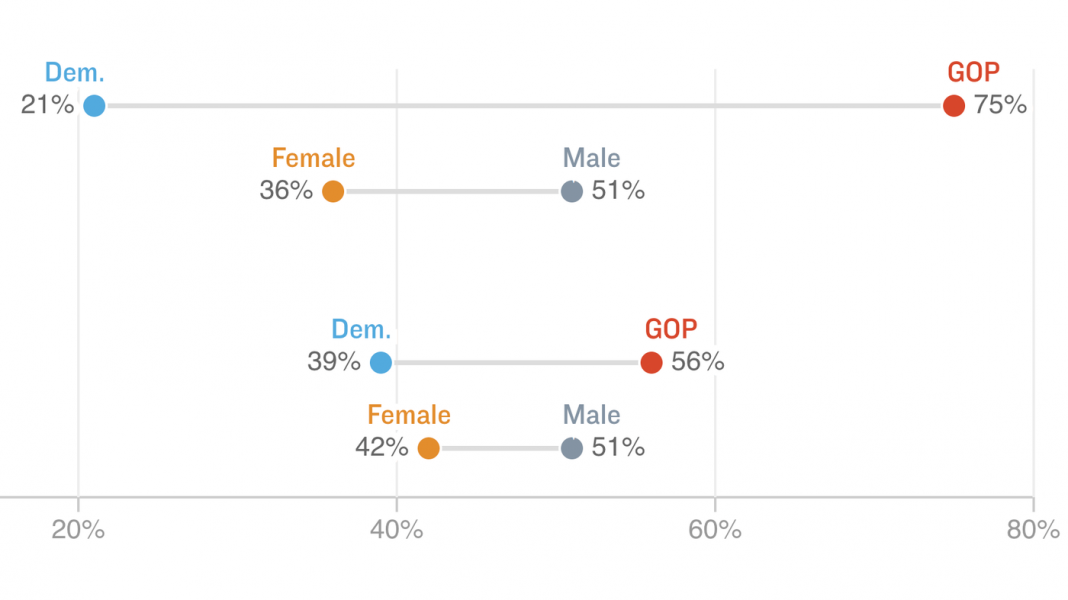One year after the #MeToo motion removed, brand-new NPR-Ipsos surveys reveal the country deeply divided on sexual attack and harassment, with cracks running more along celebration lines than gender.
A Lot Of– 69 percent– of more than 1,000 Americans surveyed, state the motion has actually produced an environment in which culprits will now be held responsible. However more than 40 percent feel the motion has actually gone too far.
Exactly what “too far” suggests wasn’t specified in the studies. However in follow-up discussions, numerous participants mentioned a rush to judgment, the possibility of unverified allegations messing up individuals’ professions or track records, and a bandwagon impact that might trigger some to declare sexual misbehavior for habits that does not rather increase to that level.
On whether declared victims of sexual attack need to get the advantage of the doubt, 85 percent of Democrats concur, compared to 67 percent of Republicans. That celebration space is almost two times the size of the gender space.
A comparable partisan divide emerges on providing the advantage of the doubt in cases of unwanted sexual advances. That has actually space broadened– in the previous year, mainly since of Republicans’ shift in viewpoint.
For instance, 53- year-old Cindy Bradshaw from Texas states she feels lots of claims are overstated or not genuine. “I seem like in the in 2015, that women resemble ‘Oh yeah, me too!'” she states. “I seem like a few of the women desire the compassion and the attention. And I seem like that truly, truly removes from the women that it truly took place to.”
On the concern of whether incorrect allegations of sexual attack prevail, the celebration space is quadruple the gender space: 77 percent of Republicans think incorrect allegations prevail, compared to 37 percent of Democrats.
Democrat Steve Novotny from Georgia is among the participants siding with declared victims, and dismissing what he views as a misconception of incorrect allegations.
” I believe that’s the exception rather than the guideline,” Novotny states. “I imply I believe many people would not comprise something simply to get back at somebody. They do not wish to put themselves under that public examination.”
On the other side, Republican females like 74- year-old Carolyn Ricketts from California think supposed victims need to absolutely not get the advantage of the doubt.
” I would be lured– as a lady to think a lady over a guy,” she states. “However, to see that justice is done, you can’t do that. There’s 2 sides to every story.”
That does not shock Clara Wilkins, a social psychologist at Washington University in St Louis.
” According to our research study, when there’s a dispute in between gender and celebration, celebration wins,” she states. “That’s what going to drive [people’s] mindsets.”
Undoubtedly, the studies reveal almost two times as lots of Republican females (47 percent compared to 26 percent of Democrats) fret that a guy they appreciate will be unjustly implicated of sexual attack.
Has the motion gone too far?
Among the most plain partisan divides is whether the #MeToo motion has actually gone too far. In general, 43 percent state it has. However broken down by celebration, that consists of three-quarters of Republicans compared to less than one quarter of Democrats. The split shows a reaction to the #MeToo motion that’s been growing considering that the current debate around now-Supreme Court Justice Brett Kavanaugh, whose election was threatened by allegations of sexual misbehavior.
President Trump has actually assisted reinforce the reaction, with current remarks like, “it’s a really frightening time for boys in America” since “someone might implicate you of something and you’re immediately guilty.” The NPR-Ipsos studies recommend that’s resonating with his base.
” We have women that make incorrect claims and getting on the ‘me too’ bandwagon,” states Nate Jurewicz. “And it’s messed up a great deal of men’ lives.”
Previously this month, Jurewicz, a self-described “Christian, conservative, Republican, awful Trump fan,” introduced a #HimToo Facebook page that drew almost 15,000 likes in the very first 2 weeks. It has lots of mottos like: “No guy is safe!” and memes buffooning the #MeToo motion, such as one animation– revealing “Jill” implicating “Jack” of pressing her down the hill, 300 years back.
Our survey information recommend Americans are still rather baffled about what #HimToo really suggests. ( It’s had numerous various usages in the last few years.) However the study shows that guys– and Republicans particularly– are taking note. Jurewicz states the page is not indicated to be partisan, however he yields it is drawing an extremely conservative following.
According to the NPR studies, Americans are likewise divided on whether claims of sexual misbehavior would deter them from choosing a political prospect. Sixty-four percent of Democrats state claims would be a deal-breaker, while 60 percent of Republican politicians state they would still think about supporting the prospect.
Jurewicz goes an action even more, stating even claims shown real would not in his mind immediately disqualify a political prospect. “Nobody’s ideal. So if something took place years and years back, does that mean we simply compose that individual off permanently? Let individuals choose if they wish to choose that individual or not.”
” Raising the bar too expensive”
On the other end of the spectrum are those dissatisfied that #MeToo still has actually up until now delegated go.
Almost a 3rd of females and Democrats state they think claims of sexual attack are still neglected nowadays. That’s up a little from in 2015.
For instance, 52- year-old Texas Democrat Juan Rodriguez states he thinks claims get dismissed since individuals require a level of evidence that frequently simply does not exist in sexual misbehavior cases.
” The method things are now, I believe [allegations are] simply going to get rejected,” he states. “It’s unfortunate to state, however it resembles they’re raising the bar too expensive, like you have actually got to truly show your case. However truthfully, that simply provides the wrongdoer the right to get away with things.”
Debra Katz, the lawyer who represented Kavanaugh’s accuser, Christine Blasey Ford, states she saw it very first hand. All the discuss incorrect allegations she states is simply “red meat to Trump’s base.”
” These talking points are being utilized to challenge females and to weaponize this problem of unwanted sexual advances and sexual attack just merely for partisan gain,” states Katz. “The president [is] intentionally muddying the truths to puzzle individuals about what unwanted sexual advances and sexual attack are by blaming victims, and because method providing individuals a pass for taking part in the habits,” she states. “And it threatens.”
Eventually, Katz thinks, the reaction will catch the passage of time.
” The more youthful generation absolutely comprehends this problem in a manner that my generation did not,” she states. “They are stimulated, they will vote, and there’s no going back.”
Specifying harassment
The NPR-Ipsos survey reveals a lot more agreement amongst youths. For instance, less individuals under 35 think that #MeToo has actually gone too far, less state they would ever think about choosing a political prospect implicated of sexual attack, and more youths state they are clear on what counts as sexual misbehavior.
That stands in contrast to older Americans. After a year of extreme concentrate on sexual misbehavior, half of those surveyed state they’re still uncertain on what crosses the line.
Damaged down by celebration, simply over a 3rd of Democrats state they’re fuzzy on what harassment suggests, compared to two-thirds of Republicans.
Eric Savignano, 49, a telecom engineer from Pennsylvania, concurs that it’s difficult to specify. However he differs with the method among his customers has actually done it.
” I need to sign a notepad that states I need to follow all these guidelines, [including] you can’t take a look at a member of the opposite sex for more than 3 seconds,” he states. “That does not make any sense to me!”
California Republican politician Carolyn Ricketts concurs that lots of meanings are too broad. However she sighs, “It’s difficult. Some individuals are too delicate.”
The remainder of the country appears to be having a hard time for a much better response. Reactions to our open-ended survey concern on what makes up unwanted sexual advances varied “unsuitable touch” and “requiring sexual favors” to “undesirable attention,” “invites,” or “anything that makes somebody unpleasant.” Numerous merely responded to, “I do not understand.”











